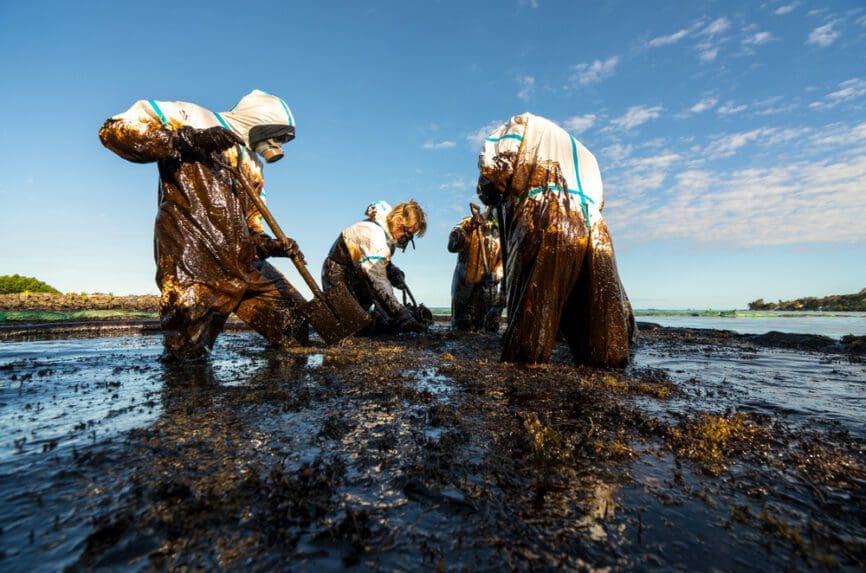Bioethics Forum Essay
Philanthropy is Not Enough: Oil and Gas Giants Must Consider Medical Ethics
Given the well-known environmental and health risks of oil and gas drilling, oil and gas giants that enter developing nations routinely offset these risks with charitable investments. Are these investments sufficient? Do the funds go where they are needed? Answering these questions raises ethical issues that need greater attention.
Oil and gas corporations refer to their investments in the developing nations where they work “acts of charity” and publicize them in documents such as ExxonMobil’s Worldwide Giving Report. In addition to their acts of philanthropy, these corporations tout their activities as likely to increase a nation’s economic standing, frequently citing improved infrastructure for citizens. These activities may help ingratiate the corporations with the developing nations, but they do not offset the risks.
Communities where these corporations operate have higher rates of many illnesses, including cancer, liver damage, neurological symptoms, and immunodeficiency. The increased disease burden raises health care costs for individuals and the public. In developing nations specifically, this can have detrimental financial effects on the health care industry itself. Previous studies have identified chronic disease in developing nations as a threat to improving the health of their populations, and deleterious environmental effects inevitably add to this burden. Increased carbon waste emissions contribute to climate change and its environmental and health harms.
Viewing these risks in the context of philanthropy as these corporations currently practice it shows shocking insufficiencies. The Hess Corporation, for example, donated $942,000 to health and health care of the nations where it worked in 2021, when its earnings were $559 million, representing a 0.16% investment. ExxonMobil invested $13 million in the health and environment of nations (including the United States) in 2021, only 0.057% of its 2021 earnings of $23 billion. This philanthropic endeavor is in no way proportionate to the earnings ExxonMobil receives from even just one nation where it operates, let alone the sum of its earnings.
Oil and gas corporations also create large economic risks for developing nations. For example, the estimated total economic impact of the multiple oil spills that occurred in Venezuela from 2010 to 2016 is $104 billion. And continuous spills there in 2020 and 2021 caused fuel shortages, which in turn resulted in harm to the country’s health system because patients and providers had difficulty finding transportation to hospitals and clinics. The transportation problem led to delayed care and strain on a health care system that was facing extreme strain during the Covid pandemic.
How are we to offset these large risks? Even if a corporation such as ExxonMobil invested the entirety of its yearly earnings in the health care sector of a single nation, it would be insufficient to cover the environmental, health, and economic burdens caused by oil spills. The problem with the charitable donations is not just that they are too small, but that they don’t address the underlying causes of the negative health consequence that they precipitate.
If oil and gas corporations genuinely want to have ethical business practices, they must consider medical ethics. Their investments need to be larger and focus on prevention, rather than simply providing more medical care infrastructure or funding the construction of health care facilities to deal with the health consequences of their operations. These investments can take various forms, including increased budgets for preventing oil spills and other disasters, reducing population exposure to hazardous products, and preventing workplace hazards. Additionally, there must be a focus on increasing primary care availability to screen, monitor, and treat risk factors for chronic disease. The corporations should also include measures to lower carbon and waste emissions. ExxonMobil’s operations in Guyana, for example, have prompted several lawsuits filed by citizens against the country’s environmental regulator because the company’s agreement does not meet the Guyanese citizens’ desire to lower carbon and waste emissions.
Without focusing on prevention, corporations’ charitable investments exploit a nation’s need for health care infrastructure but do not fulfill the mission of philanthropy, which is to promote the welfare of a nation. Only by genuinely prioritizing the health of nations through preventative strategies can oil and gas corporations truly state that they are protecting the health and well-being of the international community in which they operate.
Views portrayed in this article are solely those of the authors and do not reflect the opinions of the authors’ affiliated organizations.
Jacob Riegler, MBA, is a visiting researcher at the Harvard Business School, fourth year medical student at the University of Central Florida, and Master of Science in Bioethics student at the Alden March Bioethics Institute. Christen Ram, BSBA, BA, is a financial analyst working in the energy sector. Christelle Ram, MSc, MA, is a graduate of the London School of Economics and Political Science and the University of Southern California working in the technology industry.












